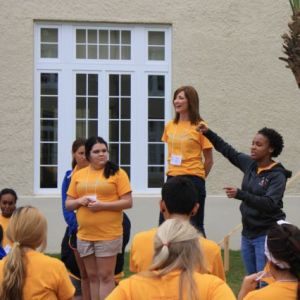
Can children and youth lead the way to recovery following catastrophic disasters?
Programs put in place with the help of Colorado State University sociologist Lori Peek suggest that not only are youth more than willing to roll up their sleeves and get to work following disasters like Hurricane Katrina and the BP/ Deepwater Horizon oil spill, they can make a substantial impact in the recovery process.
Peek, an associate professor in CSU’s Department of Sociology, will discuss her findings during the third installment of the President’s Community Lecture Series at 6:30 p.m. Sept. 30 in the Lory Student Center Theater. Peek’s lecture is titled “Katrina to Colorado: How Children of Disaster Change Lives.”
Series is gift to Fort Collins
“Lori Peek is a highly respected sociologist, and this is an opportunity for the Fort Collins community to hear about her research and insights into the science of disaster recovery,” said CSU President Tony Frank. “This lecture series is an intimate opportunity for people here in CSU’s hometown to learn about some of the most important issues of our day directly from our researchers doing life-altering work both here and around the world.”
The public is invited to the lecture series, which began earlier this year as a gift from the university to Fort Collins to celebrate the city’s 150th birthday. Previous speakers were University Distinguished Professors Dr. Stephen Withrow, veterinarian and founder of the Flint Animal Cancer Center, and Dr. Diana Wall, a renowned soil ecologist and director of the School for Global Environmental Sustainability.
Children adapt, respond
“The children and youth of the Gulf Coast region have been exposed to more disasters over the past decade than any other group of young people in the United States,” said Peek. “In many ways, they have become experts at absorbing and adapting to the consequences of these extreme events.”
While the number of disasters they have endured has created many difficulties in their lives, Peek is quick to note that young people in disaster-affected communities “are not helpless. They are eager to assist other children and youth who have experienced disaster losses in other communities.”
Extensive post-disaster research
In addition to her work in the Gulf Coast region, Peek did significant research in post-9/11 New York and in Joplin, Mo., following a 2011 tornado. She recently led up the first-ever statewide assessment of child care centers in Colorado and their plans for disaster preparedness. She has published widely on vulnerable populations in disaster and is author of Behind the Backlash: Muslim Americans after 9/11, co-author of Children of Katrina, and co-editor of Displaced: Life in the Katrina Diaspora.
Peek helped initiate the SHOREline Project, a partnership between CSU’s Center for Disaster and Risk Analysis, Columbia’s National Center for Disaster Preparedness, and the Children’s Health Fund, at six high schools in the Gulf Coast region. Students developed projects and performed community service in areas ravaged in recent years by the BP spill and Katrina. The “SHORE” in “SHOREline” stands for Skills, Hope, Opportunity, Recovery and Engagement. Peek is also the co-founder of another recovery and empowerment project called “Youth Creating Disaster Recovery.”
Lecture free; tickets required
Peek’s lecture will focus on some of her findings from various studies of children and youth in communities affected by disaster. She also will describe the SHOREline Project and her hopes to establish similar programs in Colorado high schools.
The lecture and reception following are free and open to the public, but attendees must reserve tickets.